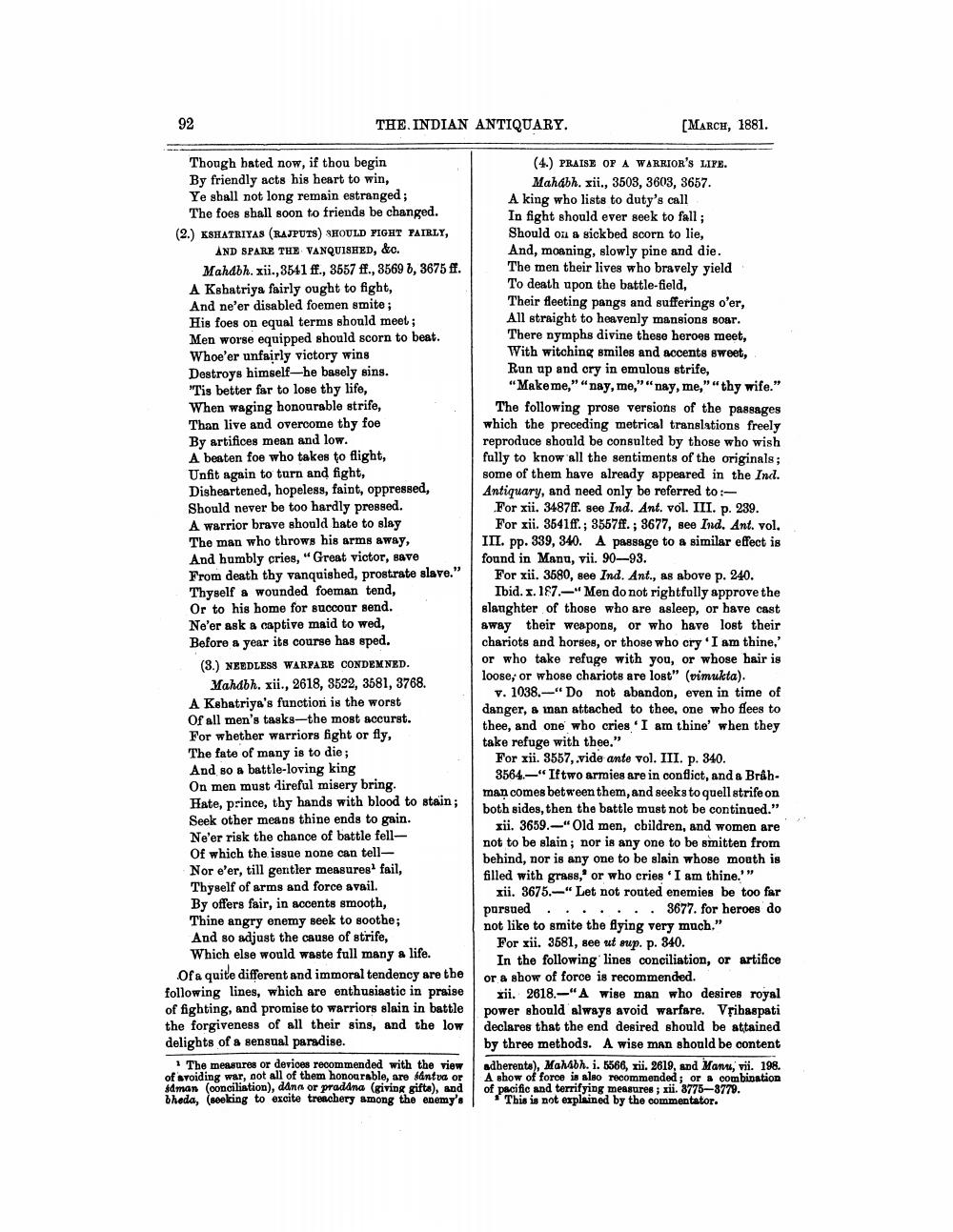________________
THE. INDIAN ANTIQUARY.
[MARCH, 1881.
Though hated now, if thou begin By friendly acts his heart to win, Ye shall not long remain estranged;
The foes shall soon to friends be changed. (2.) KSHATRIYAS (RAJPUTS) SHOULD FIGHT PAIRLY,
AND SPARE THE VANQUISHED, &c. Mahabh. xii.,3541 ff., 3557 ff., 3569 6, 3675 ff. A Kshatriya fairly ought to fight, And ne'er disabled foemen emite; His foes on equal terms should meet; Men worse equipped should scorn to beat. Whoe'er unfairly victory wins Destroys himself-he basely sins. "Tis better far to lose thy life, When waging honourable strife, Than live and overcome thy foe By artifices mean and low. A beaten foe who takes to flight, Unfit again to turn and fight, Disheartened, hopeless, faint, oppressed, Should never be too hardly pressed. A warrior brave should hate to slay The man who throws his arms away, And humbly cries, "Great victor, save From death thy vanquished, prostrate slave." Thyself a wounded foeman tend, Or to his home for succour send. Ne'er ask a captive maid to wed, Before a year its course has sped. (3.) NEEDLESS WARPARE CONDEMNED.
Yahabh. xii., 2618, 3522, 3681, 3768. A Kshatriya's function is the worst Of all men's tasks—the most accurst. For whether warriors fight or fly, The fate of many is to die; And so a battle-loving king On men must direful misery bring. Hate, prince, thy hands with blood to stain; Seek other means thine ends to gain. Ne'er risk the chance of battle fellOf which the issue none can tellNor e'er, till gentler measures' fail, Thyself of arms and force avail. By offers fair, in accents smooth, Thine angry enemy seek to soothe; And so adjust the cause of strife, Which else would waste full many a life. Ofa quite different and immoral tendency are the following lines, which are enthusiastic in praise of fighting, and promise to warriors slain in battle the forgiveness of all their sins, and the low delights of a sensual paradise.
(4.) PRAISE OF A WARRIOR'S LIFE.
Mahabh. xii., 3503, 3603, 3657. A king who lists to duty's call In fight should ever seek to fall; Should on a sickbed scorn to lie, And, moaning, slowly pine and die. The men their lives who bravely yield To death upon the battle-field, Their fleeting pangs and sufferings o'er, All straight to heavenly mansions soar. There nymphs divine these heroes meet, With witching smiles and accents sweet, Run up and cry in emulous strife,
"Make me," "nay, me,""nay, me," "thy wife." The following prose versions of the passages which the preceding metrical translations freely reproduce should be consulted by those who wish fully to know all the sentiments of the originals; some of them have already appeared in the Ind. Antiquary, and need only be referred to: For xii. 3487ff. see Ind. Ant. vol. III. p. 239.
For xii. 3541ff.; 3557ff. ; 3677, see Ind. Ant. vol. III. pp. 339, 340. A passage to a similar effect is found in Manu, vii. 90–93.
For xii. 3580, see Ind. Ant., as above p. 240.
Ibid. s. 187.-"Men do not rightfully approve the slaughter of those who are asleep, or have cast away their weapons, or who have lost their chariots and horses, or those who cry 'I am thine,' or who take refuge with you, or whose hair is loose, or whose chariots are lost" (vimukta).
v. 1038.--"Do not abandon, even in time of danger, a man attached to thee, one who flees to thee, and one who cries I am thine' when they take refuge with thee."
For xii. 3557, vide ante vol. III. p. 340.
3564.—"Iftwo armies are in conflict, and a Brahman comes between them, and seeks to quellstrife on both sides, then the battle must not be continued."
xii. 3659.-"Old men, children, and women are not to be slain; nor is any one to be smitten from behind, nor is any one to be slain whose mouth is filled with grass, or who cries I am thine."
xii. 3675.--"Let not routed enemies be too far porsued ....... 3677. for heroes do not like to smite the flying very much."
For xii. 3581, see ut sup. p. 340.
In the following lines conciliation, or artifice or a show of force is recommended.
xii. 2018.-"A wise man who desires royal power should always avoid warfare. Vsibaspati declares that the end desired should be attained by three methods. A wise man should be content adherents), Mahabh. i. 5566, xii. 2619, and Manu, vii. 198. A show of force is also recommended; or a combination of pacific and terrifying measures ; xii. 3775-3779.
This is not explained by the commentator.
The measures or devices recommended with the view of avoiding war, oot all of them honourable, are santva or sdman (conciliation), dans or pradina (giving gifta), and bheda, seeking to excite tronchery among the enemy's




